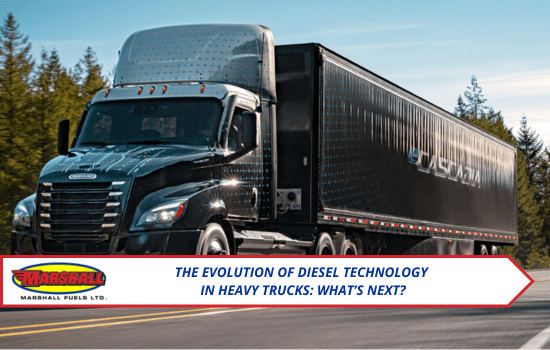Ontario’s trucking industry is witnessing groundbreaking advancements in diesel technology, focused on reducing emissions and boosting efficiency. Discover how evolving diesel innovations are shaping the future of heavy truck performance and sustainability.
The Future of Diesel Engines in Heavy Trucks: Innovations on the Horizon
Diesel technology has been the backbone of the heavy truck industry for decades, powering fleets across Ontario and beyond. As the world shifts toward greener, more sustainable energy solutions, diesel engines are also transforming. From enhanced fuel efficiency to reduced emissions, the future of diesel technology in heavy trucks is looking both innovative and promising. In this blog, we’ll take a look at the advancements in diesel engines and fuel technology that are shaping the future of trucking and what we can expect next.

The Shift to Cleaner Diesel
Diesel engines have come a long way from the smoke-belching, noisy powerhouses of the past. Today’s diesel engines are cleaner and more efficient than ever, thanks in part to innovations in fuel injection systems, turbocharging, and exhaust treatment technologies.
The introduction of ultra-low sulphur diesel (ULSD) and diesel particulate filters (DPF) has significantly reduced the environmental impact of diesel trucks, cutting harmful emissions by up to 90%. Selective catalytic reduction (SCR) technology, which uses diesel exhaust fluid (DEF) to convert nitrogen oxides into harmless water and nitrogen, has also been instrumental in reducing emissions.
According to the Engine Technology Forum, “The population of near-zero emissions diesel technology trucks is growing. They comprise 57% of all commercial diesel trucks (Class 3-8) on the roads today. These trucks are equipped with particulate filters and selective catalytic reduction systems (SCR) that achieve near-zero levels of emissions.”
These advancements align with Ontario’s stricter environmental regulations, ensuring that diesel remains a viable fuel source for the foreseeable future.
Fuel Efficiency: Getting More Out of Every Drop
One of the biggest challenges in the trucking industry is fuel consumption. As diesel prices fluctuate, truck drivers and fleet operators constantly seek ways to improve fuel efficiency. Fortunately, modern diesel engines are becoming more fuel-efficient, driven by innovations such as advanced turbocharging, direct fuel injection, and automated manual transmissions (AMTs).
These advancements allow heavy trucks to get more out of their fuel, lowering operational costs. Fleet operators in Ontario are particularly interested in fuel efficiency, as many long-haul routes stretch across the province, and any fuel savings can make a significant difference.
Diesel-Electric Hybrids: The Best of Both Worlds
While electric trucks are making headlines, diesel-electric hybrids offer a promising middle ground. These vehicles combine traditional diesel engines with electric motors to reduce fuel consumption and emissions. Diesel-electric hybrids are particularly useful for heavy-duty applications like long-haul trucking, where all-electric vehicles may still face limitations due to range and charging infrastructure.
By using the electric motor for low-speed operations and the diesel engine for highway driving, diesel-electric hybrids offer the potential for significant fuel savings, especially in stop-and-go traffic or when idling. As hybrid technology continues to advance, we can expect to see more of these trucks on Ontario’s roads, offering a practical solution for sustainable long-haul transportation.
Renewable Diesel: A Cleaner Alternative
In addition to advancements in traditional diesel engines, alternative fuels are playing an increasing role in the evolution of diesel technology. Renewable diesel is a promising option. Unlike biodiesel, which is blended with petroleum diesel, renewable diesel is chemically identical to fossil diesel but is produced from renewable sources like vegetable oil, animal fats, and waste materials.
Renewable diesel can be used in existing diesel engines without any modifications, offering an immediate reduction in greenhouse gas emissions. This cleaner-burning fuel is gaining traction and for Ontario’s trucking industry, renewable diesel presents a compelling option for cutting emissions without sacrificing performance.
Advanced Telematics for Smarter Diesel Engine Management
The evolution of diesel technology is not just about hardware; it’s also about smarter management. Telematics systems are becoming an integral part of diesel trucks, providing real-time data on fuel consumption, engine performance, and driver behaviour. These systems help fleet managers optimize routes, monitor vehicle health, and identify areas for fuel savings.
By collecting data on everything from idle time to braking patterns, telematics can help truckers and fleet operators make informed decisions that improve fuel efficiency and reduce wear and tear on diesel engines. As this technology evolves, it will continue to play a key role in maximizing the performance of diesel-powered heavy trucks.
What’s Next for Diesel?
While electric and hydrogen-powered trucks are on the horizon, diesel isn’t going away anytime soon. Instead, we can expect to see a continued evolution of diesel technology, with a focus on further reducing emissions and improving fuel efficiency. Some of the key trends shaping the future of diesel in heavy trucks include:
- Improved combustion technologies, will enable more efficient burning of fuel and further reductions in emissions.
- Integration of artificial intelligence (AI) and machine learning to optimize engine performance based on real-time conditions.
- Hybridization and electrification, offer more flexible and sustainable powertrain options for different applications.
- Increased adoption of renewable diesel as governments push for cleaner fuel alternatives.
As these advancements take hold, diesel engines will remain a crucial part of Ontario’s truck industry, providing reliable power while becoming more environmentally friendly.
Why Marshall Fuels Is Your Go-To for Diesel Technology
At Marshall Fuels & Truck Stop, we understand the evolving needs of today’s truck drivers. As diesel technology continues to advance, we are committed to providing the highest quality diesel fuels. Our state-of-the-art fueling stations, expert maintenance services, and commitment to sustainability ensure that you’re always prepared for the road ahead.
